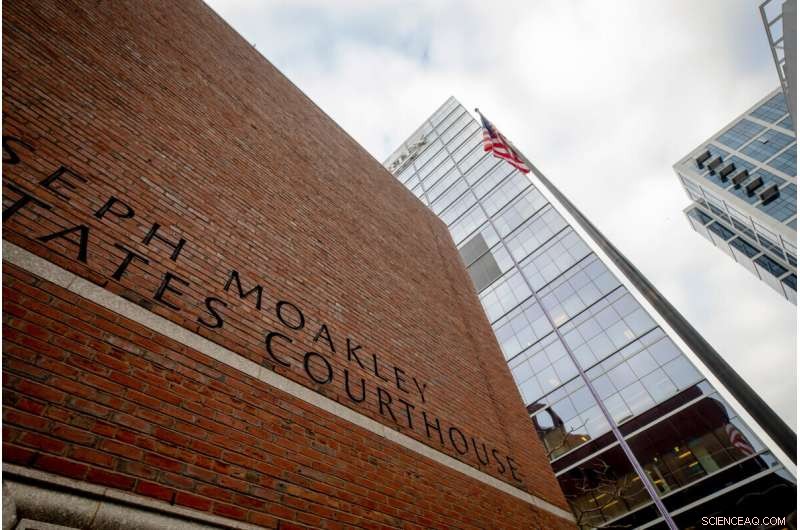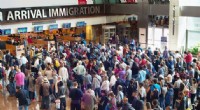
Wetenschap
Vraag en antwoord:Zwart, Latinx-mensen zijn oververtegenwoordigd in de gevangenis, studie zegt:

Moakley Courthouse in Boston. Credit:Rose Lincoln/Harvard-bestandsfoto
Een nieuw rapport van het Criminal Justice Policy Program (CJPP) van de Harvard Law School laat zien dat zwarte en Latinx-mensen oververtegenwoordigd zijn in het strafrechtsysteem van Massachusetts en dat ze bij veroordeling langere straffen krijgen dan hun blanke tegenhangers. De analyse, "Rassenverschillen in het criminele systeem van Massachusetts, " was het resultaat van een verzoek uit 2016 van Ralph Gants '76, JD '80, opperrechter van het Hooggerechtshof van de staat, voor de Law School om het probleem grondig te bekijken. De auteurs zijn onder meer CJPP Executive Director Brook Hopkins, JD '07, en fellows Elizabeth Tsai Bishop, Chijindu Obiofuma, en Felix Owusu. The Gazette interviewde Hopkins en Owusu, een doctoraat kandidaat in Public Policy aan de Graduate School of Arts and Sciences, over de verschillen en de noodzaak van beleidshervormingen.
Vraag en antwoord:Brook Hopkins en Felix Owusu
GAZETTE:Wat was de aanleiding voor het verzoek van de opperrechter van het Hooggerechtshof van de staat om de studie?
HOPKINS:In het najaar van 2016, Opperrechter Ralph Gants hield een toespraak genaamd "The State of the Judiciary", waarin hij de nadruk legde op onderzoek dat aantoonde dat Massachusetts behoorlijk grote raciale verschillen had in zijn gevangenispopulatie. Opperrechter Gants vroeg toenmalig decaan Martha Minow of Harvard een onderzoek wilde doen om enig licht te werpen op waar die verschillen vandaan kwamen. Dean Minow vroeg mijn organisatie, het programma Strafrechtsbeleid, als we die studie zouden leiden. We werkten samen met een coalitie van mensen over de hele school om een zeer diepe duik te nemen in administratieve strafrechtelijke gegevens in Massachusetts. Dit rapport is daar het hoogtepunt van.
OWUSU:Ik heb me begin 2018 bij de inspanning aangesloten, en er was al wat werk verricht om gegevens uit verschillende bronnen te verzamelen. In de loop van de afgelopen drie jaar, naast het analyseren van de gegevens, er is veel energie gestoken in het samenvoegen van datasets van verschillende bureaus, of het nu de rechtbank is of het Department of Criminal Justice Information Services of het Department of Corrections. We moesten ervoor zorgen dat de datasets van verschillende instanties allemaal met elkaar in communicatie konden staan. Dit project was een gezamenlijke inspanning omdat we inzicht nodig hadden van mensen die in het strafrechtelijk systeem werken om verschillende perspectieven in het rapport te verwerken.
GAZETTE:Laten we het hebben over de bevindingen van het rapport. U werd gevraagd de redenen te onderzoeken achter de grote ongelijkheid in het aantal gevangenen onder blanken, Afrikaanse Amerikanen, en Hispanics. Wat heb je gevonden?
OWUSU:Er is een algemeen begrip dat er raciale ongelijkheden bestaan in het strafrechtsysteem. Ons doel was om te kijken naar de verschillende punten in het proces die tot dat resultaat hebben geleid om erachter te komen waar we moeten ingrijpen om dat resultaat te veranderen. Dat is waar dit rapport echt over spreekt. Een van de dingen die we deden, was informatie afnemen van instanties waar deze databases niet met elkaar in gesprek waren en niet regelmatig werden gekoppeld of samengevoegd om dingen in de criminele geschiedenis van mensen te kunnen bekijken, hun aanklacht in het geval dat ze in, en hun gevangenisstraffen. De waarde van dit rapport is dat we kunnen spreken over meerdere stadia van dat strafrechtelijke proces dat tot die grimmige resultaten heeft geleid. Daarom is dit soort analyse belangrijk, zelfs als er al een algemeen begrip is dat er een probleem was met betrekking tot oververtegenwoordiging.
Het is een rapport van 100 pagina's dat gegevens over meer dan een half miljoen gevallen analyseert. Het is moeilijk om elke belangrijke trend te benadrukken. Maar ik wil graag een paar afhaalrestaurants onder de aandacht brengen. Eerst, we konden bevestigen dat gekleurde mensen oververtegenwoordigd zijn in alle stadia van het criminele systeem in verhouding tot hun aandeel in de bevolking in de staat. Hoewel onze gegevens zich voornamelijk richten op wat er in de rechtszaal gebeurt, de verschillen zijn al groot tegen de tijd dat mensen opduiken in de gegevens die we analyseren. Tweede, we ontdekten dat zwarte en latinx-mensen gemiddeld veel langere straffen krijgen dan hun blanke tegenhangers. We ontdekten dat een van de beslissingspunten die met name van invloed was bij het genereren van deze ongelijkheid, gelegen was in de aanvankelijke beslissingen over het aanrekenen. Het laatste wat ik wil zeggen is dat de raciale ongelijkheden bijzonder extreem waren voor beklaagden die werden beschuldigd van drugs- en wapenaanklachten. Zwarte en Latinx-beklaagden die werden beschuldigd van drugs- en wapenaanklachten, werden eerder veroordeeld, meer kans om opgesloten te worden, en krijgen langere straffen dan blanke mensen die met soortgelijke aanklachten werden geconfronteerd. Gezien wat we weten uit de geschiedenis en onderzoek uit het verleden, deze bevindingen zijn misschien niet erg verrassend voor mensen, maar ik denk dat het belangrijk was om het te documenteren en aan te tonen dat dat een essentieel onderdeel is om raciale ongelijkheden in het strafrechtsysteem te begrijpen.
GAZETTE:Wat waren de uitdagingen bij het verzamelen van de gegevens van overheidsinstanties?
HOPKINS:Wat me tijdens het doen van dit werk echt verbaasde, was hoe moeilijk het was om de gegevens op een plek te krijgen waar we ze konden analyseren. Bijvoorbeeld, we waren niet in staat om gegevens van de parketten te krijgen of voldoende gegevens te verkrijgen van politie en rechtshandhaving. Evenmin konden we definitieve veroordelingen krijgen voor de meeste mensen in onze dataset of gegevens krijgen over rechters of openbare aanklagers. We hebben gegevens over reclassering, maar we konden het niet gebruiken omdat het niet aansluit bij een voldoende aantal rechtszaken. Er waren veel problemen met de gegevens, waardoor het uiterst moeilijk was om zelfs maar tot het eindstadium van de bevindingen te komen. Het kostte veel moeite om er te komen, en dit is informatie die we zouden moeten weten, als burgers van Massachusetts, die we gewoon niet kunnen weten omdat er geen gegevens zijn.
De uitdagingen waren talrijk. Deze datasets zijn bedoeld voor operations management, not for research of the kind that we do, and it takes a long time for the agencies to even collect the data that we were asking for. One challenge is how much time it took to even get the data. We were trying to track the whole process, and we were getting data from various agencies. It took quite a lot of work to link up the data from the various agencies—to be able to link up somebody's trial court record with their criminal history or with their probation record or their Department of Corrections record. Ook, some of the agencies use different terms or fields to mean the same thing or have different definitions. We had to understand the idiosyncrasies of the various agencies, and once we had the data, we had to understand what the various fields meant. Some of that was self-evident, and some was not, which made it hard to figure out how to interpret what we were seeing. And then there was a lot missing, and we didn't know whether it was missing because it didn't happen or because it was not recorded. There are some things that are not tracked at all. Bijvoorbeeld, there's no way to tell when a person is arraigned in District Court and whether they're subsequently indicted in Superior Court. There are two separate records, and there's no link between them. In District Court, it looks like the case was dismissed and a new case is filed in the Superior Court, but they're not linked at all. Keeping track of cases throughout the system was difficult in that sense as well.
OWUSU:Another challenge was to make sure that we were interpreting everything correctly and that it reflected the reality on the ground. It's one thing to look at a data set at your computer, but we had to make sure that the data set reflected people's experience. It took a lot of time and conversations with people who were familiar with these processes because when you're trying to understand all of the cases in an entire state over three years, you have to be able to translate that information from how it's written to be used day to day to an aggregate level.
GAZETTE:What contribution does the report make in the debate about racial disparities in the criminal justice system?
OWUSU:As a researcher who works with data, I think data is an important way of understanding the world and looking at the impact of policies on people's lives. In this specific case, this kind of data helps us understand the impact with regard to racial disparities such as what charges are being levied against who and where, and what sentences apply to the charges. It's also a key input in terms of how we can be able to hold our institutions accountable. By having information and data available we can improve public policy and make sure government works the way citizens want. I'd also like to highlight the state's participation. It's not often that an effort of this scale is undertaken to understand this kind of data. This is one step in a multistep process of understanding our criminal justice system through data and using this to do better.
HOPKINS:Another contribution is that the report reveals how institutional racism permeates the whole criminal justice system and ends up playing a big role in the racial disparities in incarceration rates in the state. It's not just disparate treatment by police, prosecutors, or judges once somebody is in the system. There is also a legislative piece. We have certain behaviors that are considered a risk to public safety that are treated differently based on stereotypes about who engages in those behaviors. We have an example in the report of OUIs [operating under the influence]. In the data we analyzed, people charged with OUIs are overwhelmingly white. There is a statutory diversion program in the Massachusetts Code that allows for a first-time OUI offender to take an alcohol-education course, have probation, and then have the charge wiped from the record if they comply. In our report, we compare that to possession of an unlicensed firearm, which is a crime that is charged against Black defendants more frequently and has a pretty high statutory minimum sentence that escalates as subsequent charges are brought. The decision to treat one behavior so differently from the other is a legislative one. It's not about systems, actors, and individual cases. I think the report in some ways challenges us to look beyond the treatment of individuals in the system and think more broadly about how we use the criminal system to address public safety and public health.
GAZETTE:What do you hope to achieve with this report?
HOPKINS:It's important to remember that this is a report requested by the courts. That indicates that there is some interest on behalf of the courts in addressing this problem. I hope this report sheds some light on the nuances of the issue and will provide some ammunition to the courts and to advocates in thinking about how to prioritize policy change. I would also add the report concludes that there is some work to be done on data collection and accessibility and transparency to have a better understanding of what's happening in Massachusetts.
OWUSU:We're looking at the criminal system of an entire state over a long period of time. To fully address these problems is going to require multiple policy changes to happen because a lot of the disparities we see in this system occur before people enter the court system. The report speaks to the need to consider policies outside of the courts entirely, such as how we structure our communities, economically, maatschappelijk, how we police our communities, and what kinds of activities to criminalize at all. This is of course being discussed nationwide. Thinking of how we can broaden the scope of things outside of the criminal justice response and include a public health framing or economic justice framing is very important.
Dit verhaal is gepubliceerd met dank aan de Harvard Gazette, De officiële krant van Harvard University. Voor aanvullend universiteitsnieuws, bezoek Harvard.edu.
 Opwekking van waterstof op zonne-energie efficiënter maken in microzwaartekracht
Opwekking van waterstof op zonne-energie efficiënter maken in microzwaartekracht Nieuwe test effent de weg voor mogelijke behandelingen om Alzheimer en andere aandoeningen aan te pakken
Nieuwe test effent de weg voor mogelijke behandelingen om Alzheimer en andere aandoeningen aan te pakken Inverse ontwerpen van spontaan zelfassemblerende materialen
Inverse ontwerpen van spontaan zelfassemblerende materialen Chemische sensor op basis van materialen met moleculair geheugen gecreëerd
Chemische sensor op basis van materialen met moleculair geheugen gecreëerd Warmte en licht creëren nieuwe biocompatibele microdeeltjes
Warmte en licht creëren nieuwe biocompatibele microdeeltjes
 modellen, waarnemingen niet zo ver uit elkaar op planeten reactie op de uitstoot van broeikasgassen
modellen, waarnemingen niet zo ver uit elkaar op planeten reactie op de uitstoot van broeikasgassen Forelviskwekerij
Forelviskwekerij  Impact van bombardementen uit de Tweede Wereldoorlog gevoeld aan de rand van de ruimte
Impact van bombardementen uit de Tweede Wereldoorlog gevoeld aan de rand van de ruimte Erfgoedpotentieelkaart is bedoeld om stadsplanners te helpen de geschiedenis te behouden
Erfgoedpotentieelkaart is bedoeld om stadsplanners te helpen de geschiedenis te behouden Hoe de variaties in de waterkwaliteit in tijd en tijd worden beïnvloed door hydrologische omstandigheden in het Dongting-meer
Hoe de variaties in de waterkwaliteit in tijd en tijd worden beïnvloed door hydrologische omstandigheden in het Dongting-meer
Hoofdlijnen
- Het belang van DNA in de menselijke cel
- Afval van tarwestro kan basis zijn voor groenere chemicaliën
- Wat is de Western Blot-test?
- Waar bevindt het DNA zich in een cel?
- Secretine-eiwit met een kroon
- Wat is urushiol?
- Waarom wordt natrium gebruikt bij DNA-extractie?
- Waarom helpen rijmpjes mensen dingen te onthouden?
- Wat is Lambda Max?
- Pompeii:Oude overblijfselen helpen wetenschappers te leren wat er gebeurt met een lichaam dat is gevangen in een vulkaanuitbarsting

- Zeker zijn over onzekerheid

- Coronavirus:hoe groot is de kans dat ons gedrag in de nasleep verandert?

- Baby's van 2100 jaar geleden gevonden met helmen gemaakt van kinderschedels

- Wat zijn hemelbevingen?

 Een samenleving verdeeld door wederopbouw
Een samenleving verdeeld door wederopbouw Zelfgemaakte meetinstrumenten
Zelfgemaakte meetinstrumenten  Voordelen & nadelen van een frequentietabel
Voordelen & nadelen van een frequentietabel  Afbeelding:gloeiende zonnecel
Afbeelding:gloeiende zonnecel Nano-engineering elektroden om kleine generatoren een boost te geven
Nano-engineering elektroden om kleine generatoren een boost te geven Het pad van chemicaliën door de bodem volgen
Het pad van chemicaliën door de bodem volgen Genen zijn de sleutel tot academisch succes, studie toont
Genen zijn de sleutel tot academisch succes, studie toont 5G draadloze race warmt op
5G draadloze race warmt op
- Elektronica
- Biologie
- Zonsverduistering
- Wiskunde
- French | Italian | Spanish | Portuguese | Swedish | German | Dutch | Danish | Norway |

-
Wetenschap © https://nl.scienceaq.com

